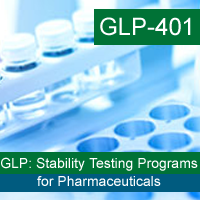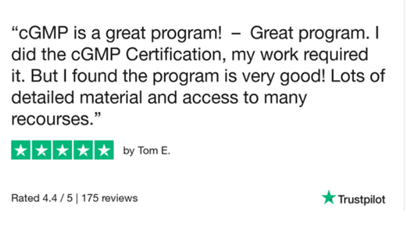GLP: Stability Testing Programs (Pharmaceuticals)
 |
Price: $ |
Document your dedication to quality, compliance, safety, and job performance by earning a certification of training.Training Program: GLP: Stability Testing Programs (Pharmaceuticals)Training Provided By: Biopharma Institute Website: https://www.biopharmainstitute.com Schedule: Self-paced. Immediate access to training materials upon enrollment. Description:  Stability testing is a crucial part of the product development process, particularly in industries like pharmaceuticals, cosmetics, food, and chemicals. The purpose of this testing is to evaluate how a product's quality changes over time under the influence of various environmental factors, such as temperature, humidity, and light. This information is essential for determining shelf life, storage conditions, and packaging requirements. The process typically involves storing the product at defined conditions and testing it at regular intervals to assess any changes in its characteristics. Key parameters that might be evaluated include physical appearance, chemical stability, microbiological stability, and functionality, depending on the product type. There are several types of stability tests, including:Real-Time Stability Testing: This is the most accurate test for determining the shelf life of a product. It involves storing the product under recommended storage conditions and testing it periodically until a predefined period expires. Accelerated Stability Testing: This method is used to speed up the aging process of a product by storing it under extreme conditions (e.g., higher temperatures). It helps in predicting the product's shelf life more quickly but must be carefully interpreted to ensure it reflects real-life conditions. Stress Testing: This involves exposing the product to conditions beyond recommended storage conditions, such as extreme temperatures, humidity, and light. The goal is to understand the degradation pathways and to identify the potential degradation products. Cyclic Temperature Stress Testing: This test subjects the product to fluctuating temperatures in repeated cycles to assess the impact of temperature variations. Photostability Testing: For products sensitive to light, this test evaluates the stability of a product when exposed to UV and visible light. The outcomes of stability testing guide the development of formulations, packaging, storage conditions, and expiration dates. Regulatory agencies around the world, like the FDA in the United States and the EMA in Europe, require comprehensive stability testing data as part of the approval process for many products to ensure they remain safe and effective throughout their shelf life. This online course introduces the student to the requirements for pharmaceutical stability testing programs, how they are reviewed, and their purpose. The basic requirements for scheduling tests will also be introduced. Certification Requirements: Students must view the entire course and successfully pass an online, multiple-choice final assessment within a 12-month period. A certificate of completion is immediately accessible in PDF format after satisfying the requirements. Biopharma Institute's online training courses include immediate access after enrollment. Username, password, and instructions are emailed to the student directly following online enrollment into the program. Course takers may attempt the final assessment any number of times, as needed, to achieve a passing score. The certificate of completion is promptly launched and made available to the student upon course completion. Certificates are issued in an encrypted PDF format, and include a watermark, unique validation code, and QR verification barcode. Once all training requirements have been satisfied the achievement can be verified from our website using the unique certificate ID or QR barcode located on the certificate. For professional certification programs, a digital badge is additionally issued to verify training and document the achievement. Digital badges can be displayed on social networking sites, such as LinkedIn, Facebook, Twitter, and Badgr. Biopharma Institute certificates and digital badges include the date of completion, but do not have an expiration date. However, compliance training is typically considered valid for a period of 3 years. Many organizations suggest that compliance training should be refreshed at least every three years to stay up to date with regulations, standards, guidelines, and to reinforce the importance of maintaining compliance. The validity period for employee compliance training would be determined by those responsible for managing quality assurance. |
Outline:OVERVIEW STABILITY Introduction International stability testing guidance Importance Purpose of stability studies Stability and container closure systems Stability and degradation products Forced degradation profile Kinetic models Review STABILITY PROTOCOLS AND SCHEDULES Introduction Stability studies Real-time studies Accelerated studies Significant changes Importance of stability protocols Stability protocols Bracketing Matrix design Testing frequency Review STORAGE CONDITIONS AND TESTS Introduction Storage conditions Stability trial storage conditions Active raw materials Finished dose forms Expected tests Presentation of results Review STABILITY RESULTS AND SHELF LIFE Introduction Stability trial design Evaluation of results Typical problems Nominating shelf life Calculating shelf life Review STABILITY INDICATING METHODS Introduction Stability indicating methods Test methods I Test methods II Review SUMMARY Summary | Objectives:- Describe the considerations for setting up stability testing programs. - Understand how to review stability testing programs. - Learn the basic requirements for scheduling tests. - List special cGMP requirements for sampling printed matter and components. - State the stability indicating methods. - Set up stability protocols and schedules, understand storage conditions and test, interpret stability results and shelf life. | |
Use our Search Form to Find What You're Looking For:
Benefits of Training with Biopharma Institute
| Immediate access to courses: | Username, password, instructions, and receipt of payment are immediately emailed upon online enrollment. |
| Self-paced, asynchronous eLearning: | 24/7 access to all course materials and assessments for 12 months. |
| Open enrollment: | No prior course prerequisites or work experience required. |
| Expertise: | Courses developed by subject matter experts (SMEs) in the area being taught. |
| Current and validated: | Training is current with respect to regulations, procedures, and 3rd party validated and/or accredited. |
| Optimized for learning: | Courses include voiceovers, easy navigation, reading materials, case studies, progress checks, and high-quality animations to increase retention of subject matter. |
| Secure and safe access: | Encrypted website and LMS connections, firewall, and daily malware scans deliver optimal security and performance. |
| Flexible final assessments: | Multiple-choice questions can be taken repeatedly until a passing score is achieved. |
| Direct access to certificates: | Upon completion, certificates are immediately issued in an encrypted PDF format. Certificates include a watermark, unique validation code, and QR verification barcode. |
| Verification of training: | Certificates are verifiable online using QR barcode or the unique ID code. Digital badges are additionally issued for all professional certification programs. |
| Training manager access: | A proprietary portal offers access to download enrollment reports, training records, account balance, and more. |
| SCORM-compliant courses: | Courses can be delivered directly to most corporate Learning Management Systems (LMS). |
| Purchase orders (POs): | POs are accepted from all companies. Request an invoice when starting the procurement process. |
| Reimbursement: | Some employers may reimburse their employees for training expenses. Check your company's policy. |
| Financial assistance: | Payment plans are available to those who qualify. Alternatively, purchasing individual courses one at a time is also an option. |
| Career advancement: | Professional certifications help demonstrate interest and dedication to career and job performance. They may be helpful for those seeking to grow their career or transitioning to a different position within an organization. Professional certifications are a great addition to a resume, offer talking points for the interview, and practical knowledge for performing duties. |
Have Questions? Contact Us:
Use the form below if you would like more information on our programs. You may want to request a quote on group training or an invoice for generating a company purchase order. For quotes or invoices please provide the course(s) and number of students. Alternatively, call toll-free from the US or Canada: +1 (888) 424-6576. International callers may dial: +1 (201) 301-8370.

 Download
Download 




